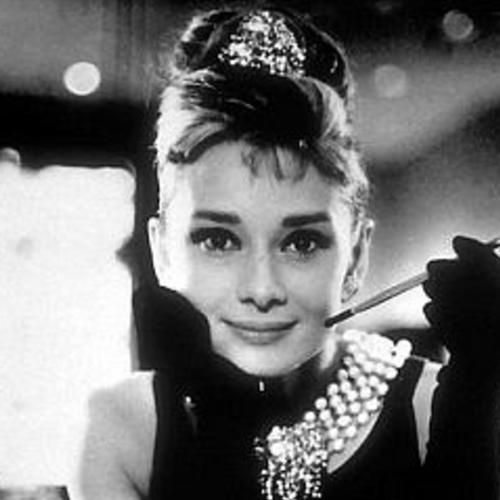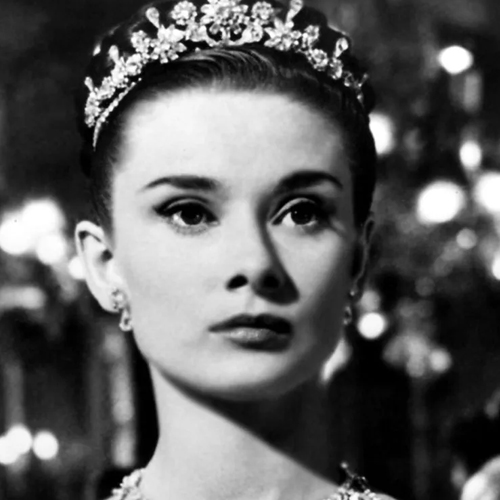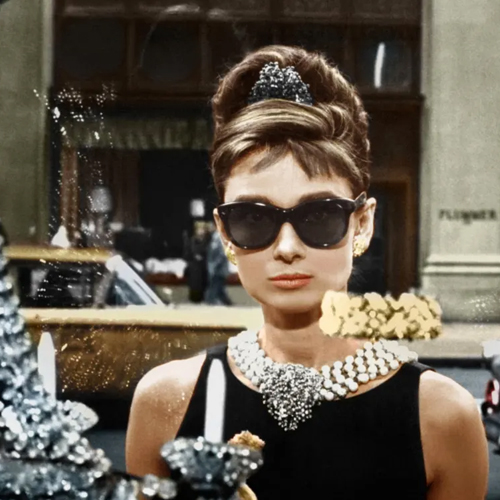
Audrey Hepburn
Born: 4 May 1929
Died: 20 January 1993 (63 Years)
Cause: Upon returning from Somalia to Switzerland in late September 1992, Hepburn developed abdominal pain. While initial medical tests in Switzerland had inconclusive results, a laparoscopy performed at the Cedars-Sinai Medical Center in Los Angeles in early November revealed a rare form of abdominal cancer belonging to a group of cancers known as pseudomyxoma peritonei.
On the evening of 20 January 1993, Hepburn died in her sleep at home.
Died: 20 January 1993 (63 Years)
Cause: Upon returning from Somalia to Switzerland in late September 1992, Hepburn developed abdominal pain. While initial medical tests in Switzerland had inconclusive results, a laparoscopy performed at the Cedars-Sinai Medical Center in Los Angeles in early November revealed a rare form of abdominal cancer belonging to a group of cancers known as pseudomyxoma peritonei.
On the evening of 20 January 1993, Hepburn died in her sleep at home.

Audrey Hepburn

Audrey Hepburn

Audrey Hepburn
Audrey Hepburn (born Audrey Kathleen Ruston; 4 May 1929 – 20 January 1993) was a British actress and humanitarian. Recognised as both a film and fashion icon, she was ranked by the American Film Institute as the third-greatest female screen legend from the Classical Hollywood cinema and was inducted into the International Best Dressed List Hall of Fame.
Born in Ixelles, Brussels to an aristocratic family, Hepburn spent parts of her childhood in Belgium, England, and the Netherlands. She studied ballet with Sonia Gaskell in Amsterdam beginning in 1945, and with Marie Rambert in London from 1948. She began performing as a chorus girl in West End musical theatre productions and then had minor appearances in several films. She rose to stardom in the romantic comedy Roman Holiday (1953) alongside Gregory Peck, for which she was the first actress to win an Oscar, a Golden Globe Award, and a BAFTA Award for a single performance. That year, she also won a Tony Award for Best Lead Actress in a Play for her performance in Ondine.
She went on to star in a number of successful films such as Sabrina (1954), in which Humphrey Bogart and William Holden compete for her affection; Funny Face (1957), a musical where she sang her own parts; the drama The Nun's Story (1959); the romantic comedy Breakfast at Tiffany's (1961); the thriller-romance Charade (1963), opposite Cary Grant; and the musical My Fair Lady (1964). In 1967 she starred in the thriller Wait Until Dark, receiving Academy Award, Golden Globe, and BAFTA nominations. After that, she only occasionally appeared in films, one being Robin and Marian (1976) with Sean Connery. Her last recorded performances were in the 1990 documentary television series Gardens of the World with Audrey Hepburn for which she won a Primetime Emmy Award for Outstanding Individual Achievement – Informational Programming.
Hepburn won three BAFTA Awards for Best British Actress in a Leading Role. In recognition of her film career, she received BAFTA's Lifetime Achievement Award, the Golden Globe Cecil B. DeMille Award, the Screen Actors Guild Life Achievement Award, and the Special Tony Award. She remains one of only seventeen people who have won Academy, Emmy, Grammy, and Tony Awards. Later in life, Hepburn devoted much of her time to UNICEF, to which she had contributed since 1954. Between 1988 and 1992, she worked in some of the poorest communities of Africa, South America, and Asia. In December 1992, she received the Presidential Medal of Freedom in recognition of her work as a UNICEF Goodwill Ambassador. A month later, she died of appendiceal cancer at her home in Switzerland at the age of 63
Upon returning from Somalia to Switzerland in late September 1992, Hepburn developed abdominal pain. While initial medical tests in Switzerland had inconclusive results, a laparoscopy performed at the Cedars-Sinai Medical Center in Los Angeles in early November revealed a rare form of abdominal cancer belonging to a group of cancers known as pseudomyxoma peritonei. Having grown slowly over several years, the cancer had metastasised as a thin coating over her small intestine. After surgery, Hepburn began chemotherapy.
Hepburn and her family returned home to Switzerland to celebrate her last Christmas. As she was still recovering from surgery, she was unable to fly on commercial aircraft. Her long-time friend, fashion designer Hubert de Givenchy, arranged for socialite Rachel Lambert "Bunny" Mellon to send her private Gulfstream jet, filled with flowers, to take Hepburn from Los Angeles to Geneva. She spent her last days in hospice care at her home in Tolochenaz, Vaud, and was occasionally well enough to take walks in her garden, but gradually became more confined to bedrest.
On the evening of 20 January 1993, Hepburn died in her sleep at home. After her death, Gregory Peck recorded a tribute to Hepburn in which he recited the poem "Unending Love" by Rabindranath Tagore. Funeral services were held at the village church of Tolochenaz on 24 January 1993. Maurice Eindiguer, the same pastor who wed Hepburn and Mel Ferrer and baptised her son Sean in 1960, presided over her funeral, while Prince Sadruddin Aga Khan of UNICEF delivered a eulogy. Many family members and friends attended the funeral, including her sons, partner Robert Wolders, half-brother Ian Quarles van Ufford, ex-husbands Andrea Dotti and Mel Ferrer, Hubert de Givenchy, executives of UNICEF, and fellow actors Alain Delon and Roger Moore. Flower arrangements were sent to the funeral by Gregory Peck, Elizabeth Taylor, and the Dutch royal family. Later on the same day, Hepburn was interred at the Tolochenaz Cemetery.
(wikipedia)
Born in Ixelles, Brussels to an aristocratic family, Hepburn spent parts of her childhood in Belgium, England, and the Netherlands. She studied ballet with Sonia Gaskell in Amsterdam beginning in 1945, and with Marie Rambert in London from 1948. She began performing as a chorus girl in West End musical theatre productions and then had minor appearances in several films. She rose to stardom in the romantic comedy Roman Holiday (1953) alongside Gregory Peck, for which she was the first actress to win an Oscar, a Golden Globe Award, and a BAFTA Award for a single performance. That year, she also won a Tony Award for Best Lead Actress in a Play for her performance in Ondine.
She went on to star in a number of successful films such as Sabrina (1954), in which Humphrey Bogart and William Holden compete for her affection; Funny Face (1957), a musical where she sang her own parts; the drama The Nun's Story (1959); the romantic comedy Breakfast at Tiffany's (1961); the thriller-romance Charade (1963), opposite Cary Grant; and the musical My Fair Lady (1964). In 1967 she starred in the thriller Wait Until Dark, receiving Academy Award, Golden Globe, and BAFTA nominations. After that, she only occasionally appeared in films, one being Robin and Marian (1976) with Sean Connery. Her last recorded performances were in the 1990 documentary television series Gardens of the World with Audrey Hepburn for which she won a Primetime Emmy Award for Outstanding Individual Achievement – Informational Programming.
Hepburn won three BAFTA Awards for Best British Actress in a Leading Role. In recognition of her film career, she received BAFTA's Lifetime Achievement Award, the Golden Globe Cecil B. DeMille Award, the Screen Actors Guild Life Achievement Award, and the Special Tony Award. She remains one of only seventeen people who have won Academy, Emmy, Grammy, and Tony Awards. Later in life, Hepburn devoted much of her time to UNICEF, to which she had contributed since 1954. Between 1988 and 1992, she worked in some of the poorest communities of Africa, South America, and Asia. In December 1992, she received the Presidential Medal of Freedom in recognition of her work as a UNICEF Goodwill Ambassador. A month later, she died of appendiceal cancer at her home in Switzerland at the age of 63
Upon returning from Somalia to Switzerland in late September 1992, Hepburn developed abdominal pain. While initial medical tests in Switzerland had inconclusive results, a laparoscopy performed at the Cedars-Sinai Medical Center in Los Angeles in early November revealed a rare form of abdominal cancer belonging to a group of cancers known as pseudomyxoma peritonei. Having grown slowly over several years, the cancer had metastasised as a thin coating over her small intestine. After surgery, Hepburn began chemotherapy.
Hepburn and her family returned home to Switzerland to celebrate her last Christmas. As she was still recovering from surgery, she was unable to fly on commercial aircraft. Her long-time friend, fashion designer Hubert de Givenchy, arranged for socialite Rachel Lambert "Bunny" Mellon to send her private Gulfstream jet, filled with flowers, to take Hepburn from Los Angeles to Geneva. She spent her last days in hospice care at her home in Tolochenaz, Vaud, and was occasionally well enough to take walks in her garden, but gradually became more confined to bedrest.
On the evening of 20 January 1993, Hepburn died in her sleep at home. After her death, Gregory Peck recorded a tribute to Hepburn in which he recited the poem "Unending Love" by Rabindranath Tagore. Funeral services were held at the village church of Tolochenaz on 24 January 1993. Maurice Eindiguer, the same pastor who wed Hepburn and Mel Ferrer and baptised her son Sean in 1960, presided over her funeral, while Prince Sadruddin Aga Khan of UNICEF delivered a eulogy. Many family members and friends attended the funeral, including her sons, partner Robert Wolders, half-brother Ian Quarles van Ufford, ex-husbands Andrea Dotti and Mel Ferrer, Hubert de Givenchy, executives of UNICEF, and fellow actors Alain Delon and Roger Moore. Flower arrangements were sent to the funeral by Gregory Peck, Elizabeth Taylor, and the Dutch royal family. Later on the same day, Hepburn was interred at the Tolochenaz Cemetery.
(wikipedia)

